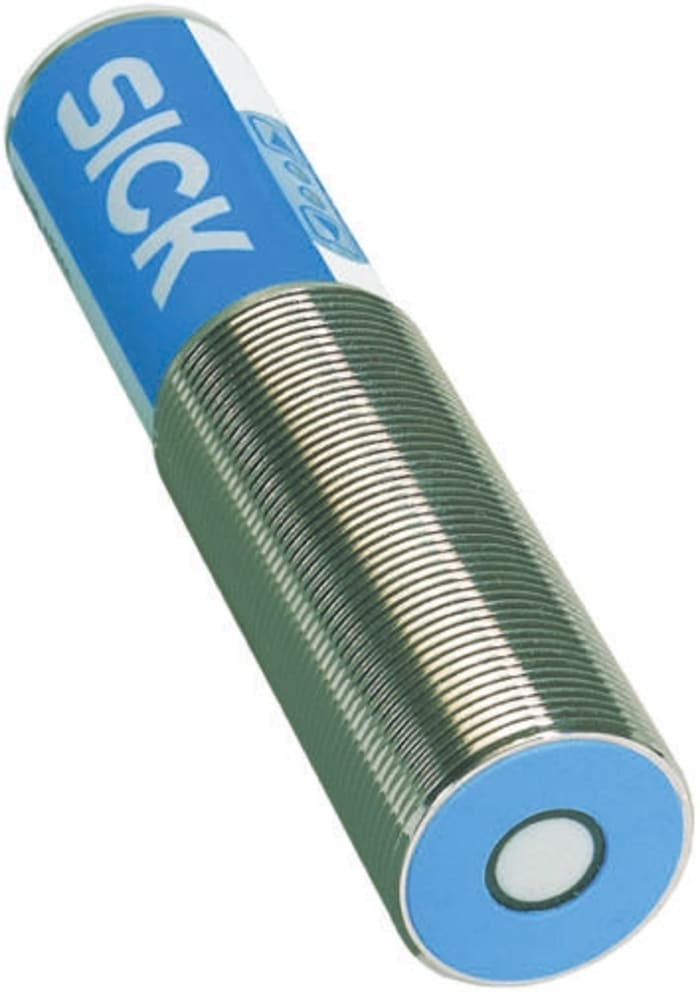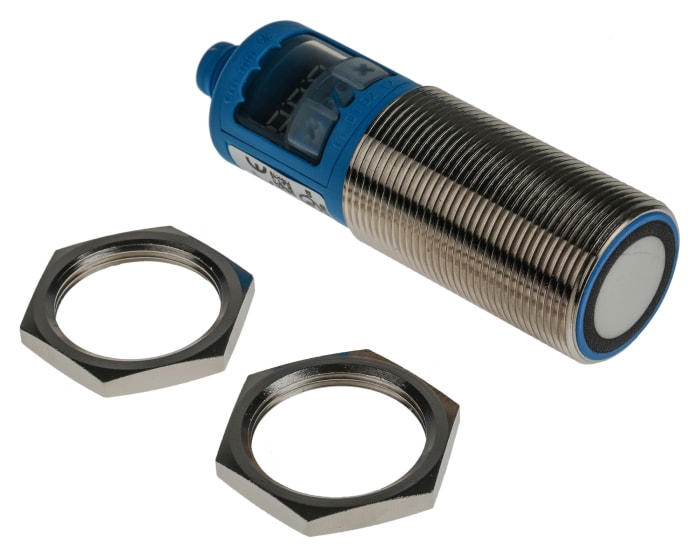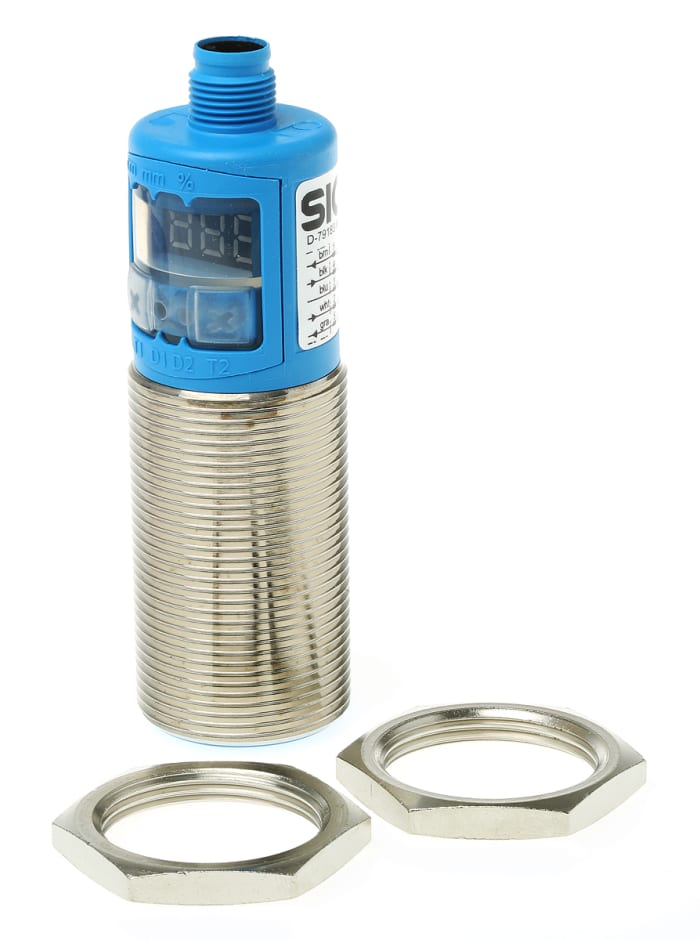Technical Document
Specifications
Brand
SickThread Size
M30
Sensor Technology
Ultrasonic
Body Style
Barrel
Detection Range
350 mm
Output Function
NC
Digital Switching Output Type
PNP
Connection Type
M12
Supply Voltage
9 → 30 V dc
IP Rating
IP67
Length
84mm
Housing Material
Brass Nickel Plated
Maximum dc Voltage
30V
Minimum Operating Temperature
-25°C
Maximum Switching Frequency
8Hz
Switching Current
200 mA
Reverse Polarity Protection
Yes
Switching Frequency
8 Hz
Short Circuit Overload Protection
Yes
Maximum Operating Temperature
+70°C
Series
UM30-212
Country of Origin
Germany
Product details
UM30-212 & UM30-213 Series
SICK UM30 ultrasonic sensors provide reliable detection results where optical sensors reach their limits. The high measurement accuracy provided by internal temperature compensation, along with colour-independent object detection and immunity to contamination all ensure reliable operation, even under the most challenging conditions. Even adverse ambient conditions such as dust, dirt, or fog hardly affect the measurement result. Whether it is position detection, distance measurement or the detection of solid, powdered or liquid substances. UM30 Ultrasonic sensors from SICK demonstrate their reliability and precision in virtually any application.
Features and Benefits
· Flexible adaptation to application requirements due to numerous configuration options and adjustable sensitivity
· Ultrasonic measuring principle with maximum reliability through intelligent analysis of measured values
· Easy system integration due to the compact design
· Reliable operation in dusty environments
· Distance to object operating mode (e.g. for applications such as height detection)
· Three operating modes: distance to object (DtO), window (Wnd), or object between sensor and background (OBSB)
· Integrated temperature compensation ensures high measurement accuracy
· Complementary switching outputs immediately signal faults
· Synchronization and multiplex mode prevent mutual interference of sensors providing reliable measurements
How do ultrasonic proximity sensor work?
Ultrasonic sensors emit a sonic pulse and monitor the signal that is reflected back. Where there is a difference in measurement, such as an object being detected, an output signal is given based on the specification the sensor is configured to. The time required for the pulse to go from the sensor to detect the object and come back again is measured, evaluated and converted into the distance.



Stock information temporarily unavailable.
Please check again later.
BD 132.110
Each (Exc. Vat)
BD 145.321
Each (inc. VAT)
1
BD 132.110
Each (Exc. Vat)
BD 145.321
Each (inc. VAT)
1



Technical Document
Specifications
Brand
SickThread Size
M30
Sensor Technology
Ultrasonic
Body Style
Barrel
Detection Range
350 mm
Output Function
NC
Digital Switching Output Type
PNP
Connection Type
M12
Supply Voltage
9 → 30 V dc
IP Rating
IP67
Length
84mm
Housing Material
Brass Nickel Plated
Maximum dc Voltage
30V
Minimum Operating Temperature
-25°C
Maximum Switching Frequency
8Hz
Switching Current
200 mA
Reverse Polarity Protection
Yes
Switching Frequency
8 Hz
Short Circuit Overload Protection
Yes
Maximum Operating Temperature
+70°C
Series
UM30-212
Country of Origin
Germany
Product details
UM30-212 & UM30-213 Series
SICK UM30 ultrasonic sensors provide reliable detection results where optical sensors reach their limits. The high measurement accuracy provided by internal temperature compensation, along with colour-independent object detection and immunity to contamination all ensure reliable operation, even under the most challenging conditions. Even adverse ambient conditions such as dust, dirt, or fog hardly affect the measurement result. Whether it is position detection, distance measurement or the detection of solid, powdered or liquid substances. UM30 Ultrasonic sensors from SICK demonstrate their reliability and precision in virtually any application.
Features and Benefits
· Flexible adaptation to application requirements due to numerous configuration options and adjustable sensitivity
· Ultrasonic measuring principle with maximum reliability through intelligent analysis of measured values
· Easy system integration due to the compact design
· Reliable operation in dusty environments
· Distance to object operating mode (e.g. for applications such as height detection)
· Three operating modes: distance to object (DtO), window (Wnd), or object between sensor and background (OBSB)
· Integrated temperature compensation ensures high measurement accuracy
· Complementary switching outputs immediately signal faults
· Synchronization and multiplex mode prevent mutual interference of sensors providing reliable measurements
How do ultrasonic proximity sensor work?
Ultrasonic sensors emit a sonic pulse and monitor the signal that is reflected back. Where there is a difference in measurement, such as an object being detected, an output signal is given based on the specification the sensor is configured to. The time required for the pulse to go from the sensor to detect the object and come back again is measured, evaluated and converted into the distance.



